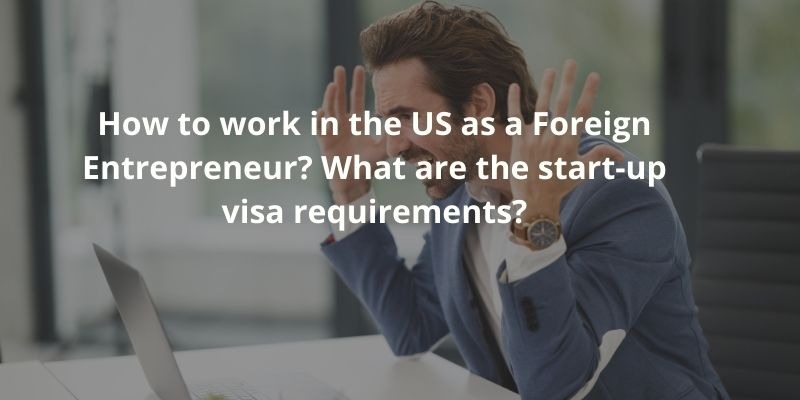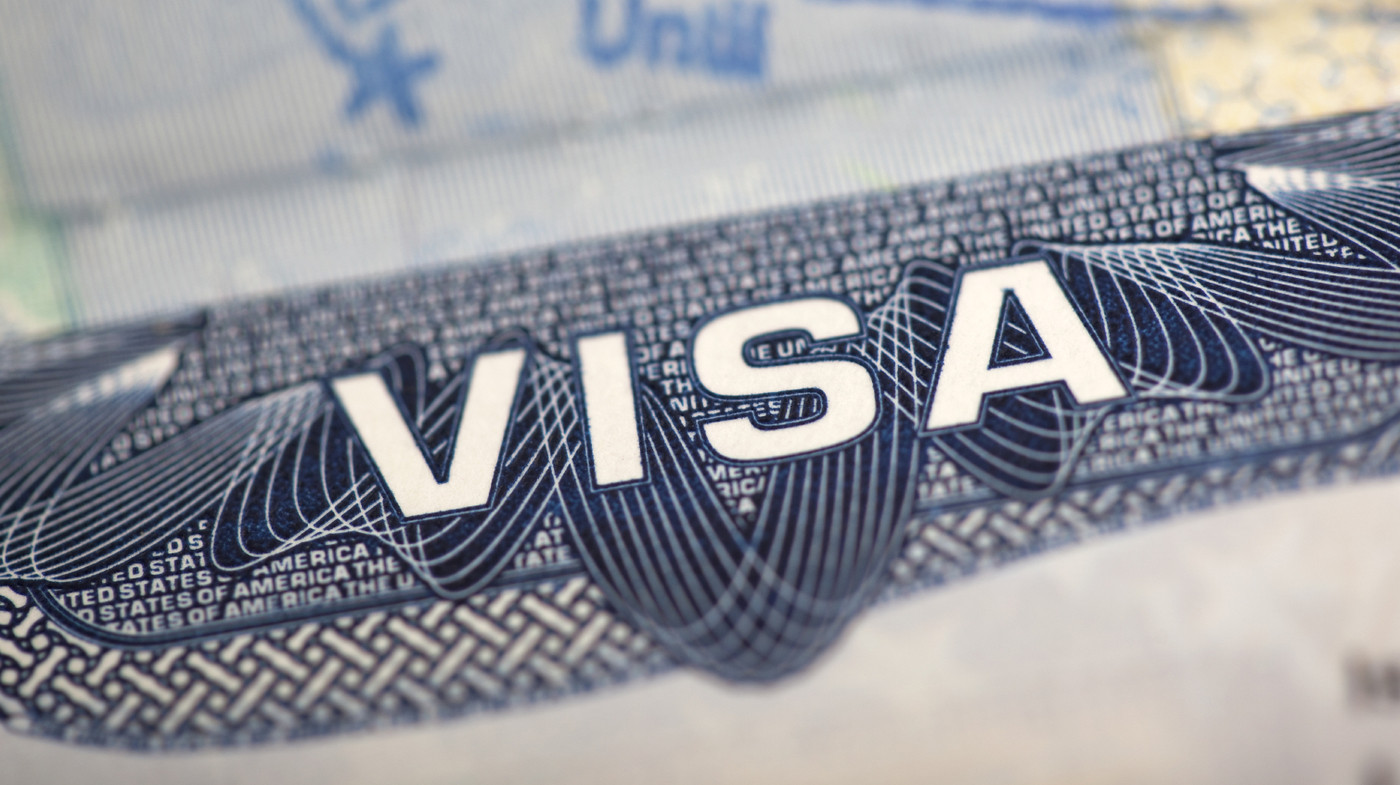How to work in the US as a Foreign Entrepreneur? What are the start-up visa requirements?
22 May 2023
12 Mar 2022
min read

Entrepreneurs can set up a company within America without a work permit. However, they would only be able to manage this company from overseas. If they wish to work in America for their company, they will need a valid start-up work visa. This article outlines the best visa options for entrepreneurs hoping to set up their own business that they will work in the United States.
There are five different types of visas. The O-1 and EB1 depend on merit and are considered harder to obtain as they require demonstration of achievement in a field of work. The E2 and EB-5 are investor visas as they depend on the amount of money an individual can invest in a US company. The EB1C and L1 are eligible for individuals working as an executive/managers at the company. The EB-2 and H1b visas are for skilled professionals. Finally, the International Entrepreneur Parole, while not a visa, is parole granted by the government to allow an individual to stay in the United States as a foreign entrepreneur. Below, we will go more in-depth about each of these “visas” as well as their requirements.

A. Merit-Based Visas
1. O-1
The O-1 is a nonimmigrant visa for an individual who “possesses extraordinary ability in the sciences, arts, education, business, or athletics, or who has a demonstrated record of extraordinary achievement in the motion picture or television industry and has been recognized nationally or internationally for those achievements.” To qualify for this visa, you will need to be among the top percentage of individuals in the field that you work for. The visa can be renewed indefinitely as long as you are operating the business.
2. EB1
The EB1 is an immigrant visa for an individual who is “able to demonstrate extraordinary ability in the sciences, arts, education, business, or athletics through sustained national or international acclaim.” Their achievements must be recognized through extensive documentation. This documentation is measured through USCIS’ point system (an individual needs 3 points to prove they have “extraordinary ability” or 2 points to prove that they are an “outstanding professor/researcher”). This visa is considered difficult to obtain. For example, one criterion in demonstrating if an individual has “extraordinary ability” is “evidence of receipt of lesser nationally or internationally recognized prizes or awards for excellence”.
B. Investor Visas
3. E2
The E2 is a nonimmigrant visa for individuals that will be investing at least $100,000 in a U.S. business. The individual must also invest in the company to develop/direct the company. Only citizens of countries where the United States maintains a treaty of commerce and navigation can be eligible for this visa. Although the visa does not lead to a green card, the visa does allow for the spouse and children of the individual to obtain US immigration benefits.
4. EB-5
The E2 is an immigrant visa for individuals that will be investing at least $500,000 in a U.S. business. They must also plan to create at least ten full-time jobs within the United States. The individual must also invest in the company to develop/direct the company. The visa will also allow for the spouse and children (under the age of 21) of the individual to apply for a Green Card.

C. Executive/Managerial Role
5. EB1C
The EB1C is an immigrant visa/green card that would allow an entrepreneur from a foreign company to transfer to a US company. This visa requires there to be a foreign company with a US branch. The individual applying for the visa must have worked in an executive or managerial role for at least one year. Finally, the US branch must have been fully operational for at least one year. The visa will also allow for the spouse and children (under the age of 21) of the individual to apply for a Green Card.
6. L1
The L1 is a non-immigrant visa that would also allow an entrepreneur from a foreign company to transfer to a US company. This visa requires that there is a foreign company with a US branch. The individual applying for the visa must have worked as an executive/manager/specialized knowledge worker for at least one year. The visa allows for the spouse and children of the individual to obtain US immigration benefits.
D. Skilled Professionals
7. EB-2
The EB-2 visa is an immigrant visa for skilled professionals that are hoping to set up their own business in the United States. Individuals applying for this visa must hold an advanced degree (Master’s, Ph.D., or bachelor’s degree with five years of work experience) OR possess an “exceptional ability” in the field. Usually, another requirement for the EB-2 visa is that the individual needs an employer’s sponsorship. However, in the case of an entrepreneur, they can bypass this sponsorship if they meet the NIW criteria. The three criteria are that their business has substantial merit/national importance, the individual can advance their business, and that it would be of interest to the United States to waive the sponsorship criteria. The visa allows for the spouse and children of the individual to obtain US immigration benefits.
8. H1b
The H1b is a non-immigrant visa for skilled foreign nationals with at least a bachelor's degree. The visa requires an individual to have an employee sponsorship; however, in the case of entrepreneurs, they can provide documentation of their investors, shareholders, or terms/conditions of employment. This visa is ideal for lawyers, physicians, architects, engineers, or other skilled professionals that intend to come to the U.S. to set up their business. The spouse and children of the individual will also be eligible for parole.

Parole
9. International Entrepreneur Parole
Parole was granted by the DHS to an international entrepreneur that would allow them to temporarily live and work in the United States. The parole will grant an individual to stay in the US for up to 30 months. Entrepreneurs are eligible if they possess substantial ownership in a startup that was formed in the last five years. The startup must demonstrate potential for rapid growth/job creation and prove that they have a significant public benefit. The spouse and children of the individual will also be eligible for parole.
|
Visa Name |
The time it Takes to Apply |
Cost to Apply |
Immigrant (Green Card) vs. Non-Immigrant |
Approval/ Rejection Rate |
Link |
|
O-1 |
Takes around two to three months for the USCIS to process the visa application |
Form I-129, Petition for Nonimmigrant Worker: $460 |
Non-Immigrant Visa |
75-80% Approval Rate (Visa requirements difficult to fulfil) |
|
|
E2 |
Takes around two weeks to four months and another week for the visa to be issued |
USCIS filing fee for form DS-160: $205 |
Non-Immigrant Visa |
89% success rate |
https://www.uscis.gov/working-in-the-united-states/temporary-workers/e-2-treaty-investors |
|
EB-5 |
Takes around six months for the visa to be approved |
USCIS filing fee for Form DS-260: $325 EB-5 application: $3,675 Total: $4000 |
Immigrant Visa (Green Card) |
75-80% success rate |
https://www.uscis.gov/working-in-the-united-states/permanent-workers/eb-5-immigrant-investor-program |
|
EB-1-C |
Takes around 7.5 months to 16 months to process |
USCIS filing fee for Form I-140: $700 Department of State visa processing fee: $345 Total: $1045 |
Immigrant Visa (Green Card) |
90% success rate |
|
|
L-1 |
Takes around 6 months to one year to obtain |
USCIS filing fee for Form 1-129: $460 DS-160 MRV filing fee: $190 Total: $650 |
Non-Immigrant Visa |
70-80% success rate |
https://www.uscis.gov/forms/explore-my-options/l-visas-l-1a-and-l-1b-for-temporary-workers |
|
EB-2 |
Takes around 18 months to process the visa |
USCIS filing fee for Form I-140: $700 USCIS filing fee for Form I-485: depends on age, Total; $750-$1140 |
Immigrant Visa (Green Card) |
No Information |
|
|
H-1B |
Takes around 1 to 6 months to process the visa |
USCIS filing fee for Form I-129: $460 |
Non-Immigrant Visa |
32% chance of being in visa lottery around 90% approval for the selected rate |
https://www.uscis.gov/working-in-the-united-states/h-1b-specialty-occupations |
|
Parole |
No Information |
USCIS filing fee for Form I-131: $575 |
Parole |
No Information |
https://www.uscis.gov/humanitarian/humanitarian-parole/international-entrepreneur-parole |
Practical Steps for Overseas Applicants
The following are practical steps to be taken for overseas applicants:
- Find out the requirements for operating a business in the US and consult an attorney if required. You may not necessarily be in the state you are operating, such as a Delaware company, if you are looking for the most efficient tax structure. Please read here for more details on US tax filing requirements.
- Register your business with the right structure before starting out. You will want to process your visas and others at the same time.
- Get a physical address for your business. You will need it to obtain a bank account and for government filings.
- Apply for an Employer Identification Number from the International Revenue Service.
- Open a US bank account for transactions.
- Maintain good accounting records through an effective system.
Documentation requirements:
- Passports
- 2x2 Photographs
- Civil Documents
- Proof of Financial Capability
- Complete Medical Examination Forms
- Reference Letters (if required)
DocPro can assist you when you are applying for startup visas. Use Docpro’s template to request a reference letter from past employers. These reference letters will be part of your startup visa application, and it is important to write a formal/courteous request for reference.
Please note that this is a general summary of the position under common law and does not constitute legal advice. As the laws of each jurisdiction may be different, you may wish to consult your lawyer.
Keywords:
